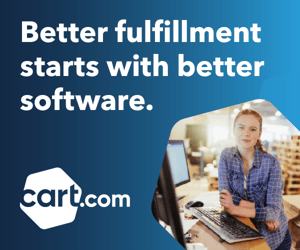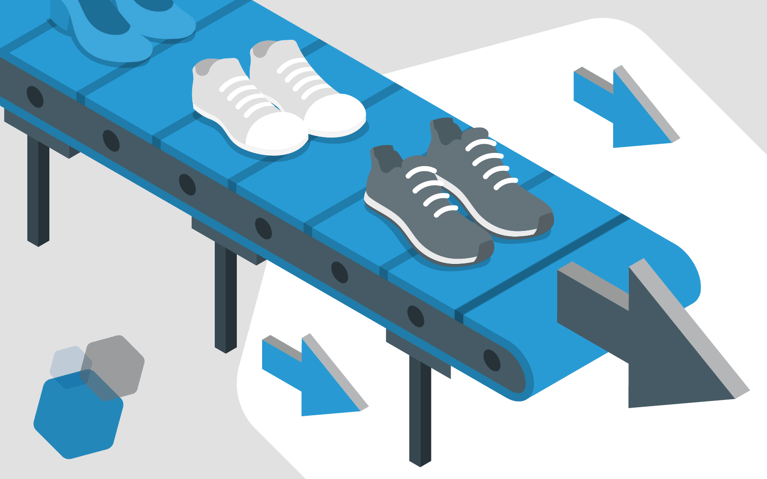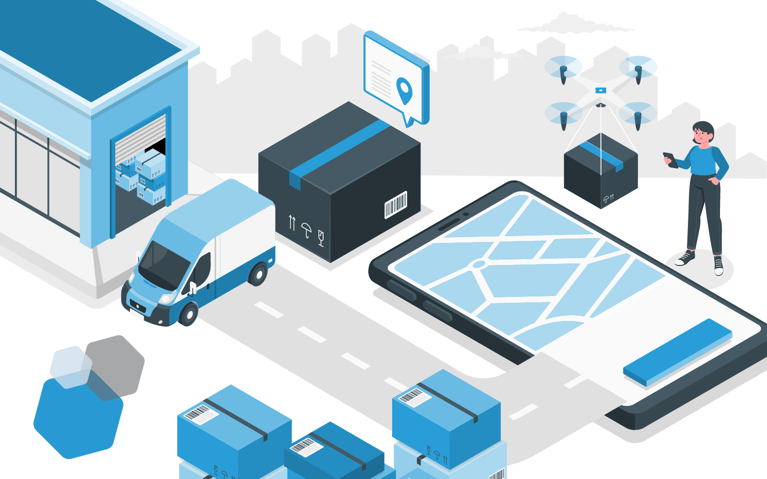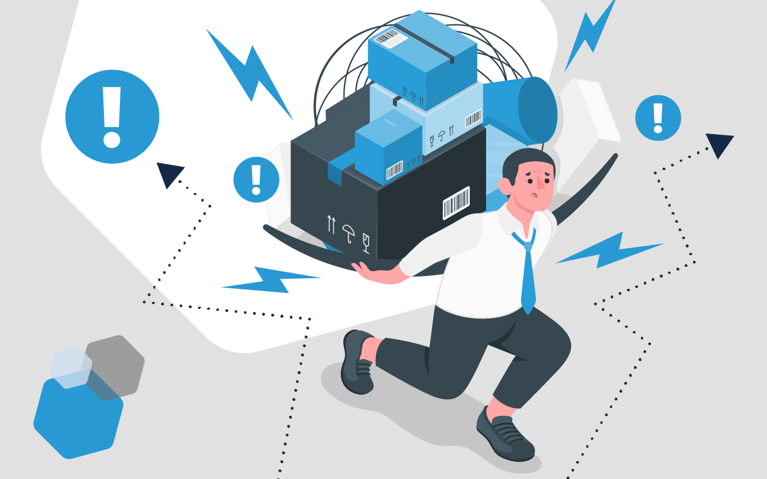Different products come with different needs. Think about it: You wouldn’t use the same storage method, inventory management or packaging for glass vases versus pet food. Each brand and its product range have its own unique requirements based on size, fragility, value, volume, SKU volume, storage requirements and more. This makes it crucial to choose a fulfillment provider that best suits your specific omnichannel fulfillment needs.
In this article, we’ll focus on the unique needs for electronics, sporting goods, footwear, beauty and apparel fulfillment and the steps for selecting the optimal fulfillment provider.
What is omnichannel fulfillment?
As brands expanded to sell through multiple channels – such as online marketplaces, brick-and-mortar stores, social media, mobile apps and digital stores – fulfillment had to adapt. Omnichannel fulfillment emerged, offering brands a comprehensive approach to retail operations. It seamlessly integrated various sales channels to provide customers with a unified shopping experience. Customer orders are fulfilled across multiple channels while centralized software synchronizes inventory, sales and customer data. This omnichannel strategy reassures customers that they can browse, purchase and return products through their preferred channels interchangeably. It provides convenience, flexibility and consistency, regardless of how customers interact with the brand.
By embracing the key elements of omnichannel fulfillment, retailers have the potential to significantly enhance customer satisfaction, increase sales and build brand loyalty. The inventory visibility across all channels, flexible delivery and fulfillment options (for example, ship-from-store, buy online pick up in-store - BOPIS), unified customer profiles and integrated order management systems (OMS) all contribute to a seamless shopping experience that meets the needs and preferences of modern consumers.
What unique fulfillment requirements are there?
Fulfillment involves inventory storage, order management, pick and pack and ship. Fulfillment needs can vary, especially depending on industry. For example, a brand may need more specialized fulfillment services based on:
Product size
Product size plays a crucial role in fulfillment operations and requires careful consideration to optimize efficiency, minimize costs and meet customer expectations. Product size significantly impacts fulfillment operations in several ways:
- Storage and warehousing: Larger products require more space for storage, which can affect warehouse layout and storage systems. Specialized storage solutions may be needed to accommodate oversized items efficiently.
- Handling and transportation: Larger products are often heavier and bulkier, requiring specialized equipment and handling procedures for picking and packing, and shipping. This can increase labor costs and transportation expenses.
- Packaging: Packaging requirements for larger products may differ from standard-sized items. Custom packaging solutions may be necessary to ensure product protection and cost-effective shipping.
- Shipping costs: Larger products typically incur higher shipping costs due to their size and weight. This can impact pricing strategies and overall profitability for online retailers.
- Customer expectations: Customers may have specific expectations regarding the delivery of larger items, such as white-glove delivery services, such as assembly and removal for furniture or appliances. Meeting these expectations requires careful coordination and planning.
SKU count
Managing a high SKU (Stock Keeping Unit) count requires robust warehouse management systems, efficient processes and careful planning to optimize fulfillment operations and meet customer expectations. A high SKU requires fulfillment operations to focus on:
-
- Storage and organization: Managing a large number of SKUs requires adequate storage space and efficient organization systems in warehouses. Without proper organization, locating and retrieving specific items becomes time-consuming and inefficient.
- Inventory management: High SKU counts increase the complexity of inventory management processes, including tracking stock levels, replenishment and cycle counting. Implementing strong inventory management systems and processes is essential to prevent stockouts, overstocking and inventory discrepancies.
- Picking and packing: Fulfilling orders with a high SKU count involves picking items from various locations within the warehouse. This can lead to longer picking times and increased labor costs. Optimizing picking routes and using technology such as pick-to-light systems can improve efficiency.
- Order accuracy: With a larger number of SKUs, the risk of picking errors and order inaccuracies also increases. Implementing quality control measures, such as barcode scanning and order verification processes, helps minimize errors and ensure order accuracy.
- Shipping and logistics: A diverse product range may require different packaging sizes and shipping methods, adding complexity to logistics operations. Efficient packaging solutions and carrier selection are essential to minimize shipping costs and transit times.
Temperature control
Some brands deal with products that are sensitive to temperature fluctuations, such as perishable goods, supplements or cosmetics. Temperature-controlled storage ensures that these products maintain their quality, efficacy and safety throughout the storage period. Without proper temperature control, these sensitive items may degrade, spoil or become ineffective, leading to product loss, customer dissatisfaction and potential regulatory issues. Temperature-controlled storage is crucial for companies that must preserve the integrity of its products and uphold brand reputation.
Security
Some companies deal with products that require protection from theft, tampering or unauthorized access due to their high value or sensitive nature. This could include sectors like government fulfillment or healthcare fulfillment. Secure storage facilities often provide features like surveillance cameras, access control systems and alarms to safeguard these products. Businesses must secure these items or face significant financial losses, brand reputation damage and legal liabilities, making secure storage essential for protecting both the company's assets and its reputation.
Customization
Brands may require customization in fulfillment to meet diverse customer demands and preferences effectively. Tailoring orders based on individual preferences can enhance customer loyalty. Customization also allows brands to differentiate themselves in the market, offering unique products or services that competitors may not provide. Personalized fulfillment can lead to increased sales and revenue as customers are more likely to purchase from brands that cater to their specific needs and preferences. Personalized packaging, is one example of customization, where a brand tailors the packaging design or adds custom messages or branding elements to each order based on customer preferences. This creates a unique and memorable unboxing experience for customers, enhancing brand perception and loyalty.
Value added services
Value-added services are the offerings beyond basic order processing and shipping, such as gift wrapping, kitting, cross-docking, UPC labeling and relabeling, returns management or assembly. These services elevate the customer experience, increase operational efficiency and add value to the product. For businesses, they provide opportunities to differentiate from competitors, increase customer satisfaction and potentially command premium pricing. Value-added services can also streamline operations, reduce costs and improve inventory management by outsourcing certain tasks to fulfillment partners with specialized expertise. Overall, they contribute to a more comprehensive and competitive fulfillment strategy.
What are some unique fulfillment needs for apparel, beauty, electronics and sporting goods?
Each retail and B2B industry vertical has its own specific fulfillment needs. While some are brand specific, many are common for product lines and types. It’s vital to choose a fulfillment provider or implement operations that can handle these requirements. Brands that are starting, growing or scaling should consider some of these typical essentials:
Apparel fulfillment
Providers specializing in apparel fulfillment, which includes footwear fulfillment and accessories fulfillment should be equipped to handle things such as:
- Garment handling: Properly sorting, storing and processing clothing items with care to avoid damage or wrinkles.
- Size and style variability: Managing inventory with different sizes, colors and styles.
- Quality control: Inspecting garments for defects, ensuring accurate labeling, and maintaining brand standards.
- Seasonal fluctuations: Handling fluctuations in demand based on seasonal trends and promotional activities.
- Returns management: Facilitating the smooth returns processing, including inspecting items for resale, restocking or disposal.
Beauty fulfillment
Services specializing in beauty fulfillment, including cosmetics fulfillment and body care fulfillment, should be proficient in:
- Handling fragile items: Safely packaging delicate beauty products to prevent breakage or leakage during transit.
- Batch and lot management: Ensuring accurate tracking and traceability of products, especially for items with expiration dates or specific batch requirements.
- Customization capabilities: Offering options for personalized packaging or product bundling to enhance the customer experience.
- Subscription management: Managing recurring orders, automatic replenishment and subscription cancellations or modifications efficiently.
- Regulatory compliance: Adhering to industry regulations and standards for handling cosmetics and skincare products, including proper labeling and documentation.
Electronics fulfillment
Fulfillment providers specializing in electronics fulfillment should be capable of:
- Handling delicate electronics: Safely packaging and shipping electronic devices to prevent damage during transit, including using anti-static materials where necessary.
- Quality control: Conducting thorough inspections to ensure products are in working condition before shipping, reducing returns and customer dissatisfaction.
- Managing serialized inventory: Tracking individual units with unique serial numbers for warranty purposes and traceability.
- Offering kitting and bundling services: Assembling product bundles or kits containing multiple electronic components or accessories.
- Providing value-added services: Offering services such as product testing, refurbishment and customization to meet specific client needs.
Sporting goods fulfillment
Providers specializing in sporting goods fulfillment should be capable of:
- Handling varying product sizes: Managing a wide range of product sizes, including large items such as exercise equipment, bicycles or sports gear like kayaks or surfboards.
- Specialized packaging: Using appropriate packaging materials and techniques to ensure the safe transport of large and irregularly shaped items, minimizing the risk of damage during transit.
- Assembly and customization: Offering assembly services for products that require it, such as bicycles or fitness equipment, as well as customization options like personalization or branding.
- Inventory management: Efficiently managing inventory for items with varying sizes and dimensions, optimizing storage space and retrieval processes.
- Shipping options: Providing flexible shipping solutions to accommodate the bulkiness of sporting goods, including options for freight shipping or white glove delivery services for oversized items.
How can a 3PL help brands meet their unique omnichannel fulfillment needs?
The right 3PL can help with unique omnichannel fulfillment needs by providing expertise in managing multiple sales channels, including ecommerce platforms, brick-and-mortar stores and third-party marketplaces. They offer integrated technology solutions that enable seamless order processing, inventory management and shipping across various channels. A 3PL can also customize fulfillment strategies to align with each brand's specific requirements, such as prioritizing certain channels or implementing special packaging and labeling for different sales channels. Leveraging the capabilities and resources of a 3PL allows brands to optimize their omnichannel operations and improve the post-purchase experience. Contact the fulfillment experts at Cart.com today to find out the capabilities we offer for varying industries and product lines.

-1.webp?width=400)






